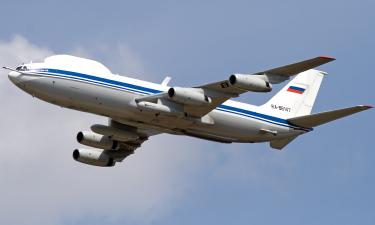Iran Arms Itself and Warns That if Attacked It Will Respond With Global Attack
Iran Arms Itself and Warns That if Attacked It Will Respond With Global Attack

Pressured by the United Nations (UN) and world powers because of its nuclear energy program, the revolutionary government of Iran has put into operation an atomic plant, and showed the world that they have an unmanned long range combat aircraft and warned the United States and Israel that it would trigger a global war should they be attacked by another country.
Using the language of apocalyptic war, Iranian President Mahmud Ahmadinejad promised a response "on a planetary scale" if his country is attacked. "Our options will have no limits, and will involve the whole planet," warned the Iranian president.
A day after putting into operation the first atomic plant in Iran, President Mahmoud Ahmadinejad showed the world their first unmanned long-range combat aircraft, developed and manufactured entirely within the country.
Called the Drone, the unmanned aerial vehicle is able to perform long-distance bombing against targets on the ground flying at high speed, piloted and commanded remotely by the military in distant locations from the aircraft and target to be reached.
Mahmoud Ahmadinejad attended the presentation of the plane a day after inaugurating the Bushehr nuclear plant, built by Russia and aimed at generating energy.
According to Iranian journalists in February, Iran inaugurated a production line of two types of aircraft capable of bombing and reconnaissance. Before showing the Drone, the Iranian defense minister said his country was ready to unveil a project of "great importance" and that Iran's defense capability has reached a point that they do not need any help from other countries.
Unmanned aircraft are resources more and more used by armed forces worldwide, especially by the United States. However, critics of the weapon say that pilots and commanders of the operations, which are thousands of kilometers away while commanding the aircraft by remote control, are unable to correctly judge whether there is a need for a bombing a given target .
One day before presenting to the world the unmanned long range reconnaissance bomber, Iran launched its first atomic plant at Bushehr, in the south of the country on the shores of the Persian Gulf. It was built by Russian engineers, according information from Rosatom, the Russian nuclear company.
The director of the Atomic Energy Organisation of Iran, Ali Akbar Salehi, and the head of Rosatom, Sergei Kirienko, attended the official opening ceremony of the plant, approved by the International Atomic Energy Agency (IAEA).
The governments of Iran and Russia ensure that the Bushehr plant will be designed solely to generate electricity, and its facilities may not be used for military purposes. Salehi said that it is "historic" and "unforgettable" for Iran, and thanked Russia for its cooperation in the construction of the the plant and in the transfer of nuclear technology, according to Russian news agencies.
"Despite all the pressures and sanctions imposed by Western countries, we are witnessing the beginning of work on the biggest symbol of Iranian peaceful nuclear activities," Salehi said at the ceremony that put intooperationthe atomic plant in Iran.
The 82 tons of Russian nuclear fuel were transported to the chamber of the reactor core, which has a thousand megawatts of power. "From now on, the reactor is a nuclear power plant," said the Russian Sergei Kirienko.
Kirienko explained that the uranium fuel rods are loaded into the reactor in the coming weeks, and that the plant will begin generating electricity by the end of this year, several months earlier than planned initially.
The German company Siemens began work on the plant in 1974, but had to suspend the project after the explosion of the Iranian revolution in 1979. The Bushehr project is unique and has no analogues in the world. Its works began in 1974, and experts were able to build a plant on old foundations and equipment used by the German company more than 30 years ago.
The Russian corporation Atom Stroy Export resumed construction after signing a contract with Iran in February 1998, but since then the project suffered numerous delays due to suspicions of the international community about the existence of an Iranian military nuclear program.
Faced with criticism from the United States and Israel, Rosatom insists that the two phases of the nuclear cycle of the power plant, which can be used for both civilian and military purposes, take place on Russian territory.
This is the uranium enrichment and recycling of spent nuclear fuel for the power station, with additional written assurances from Iran that the fuel will be used exclusively in the central location for the generation of electricity. Moreover, Moscow and Tehran signed an additional protocol on the return to Russia of spent nuclear fuel.
Using a language of apocalyptic war, Iranian President Mahmud Ahmadinejad promised a response "on a planetary scale" if his country is attacked. "Our options have no limits, and will cover the whole planet," said the Iranian president, in response to a question asked by journalists about what would be the reaction from Tehran to an external attack.
"I believe that some individuals think about attacking Iran, in particular within the Zionist entity (Israel), but they know that Iran is an indestructible wall and I do not think their masters, the Americans, will allow them to do it," said Ahmadinejad. President Ahmadinejad defended, on the other hand, the resumption of the initiative of Brazil and Turkey on an exchange of enriched uranium.
Iran has put its nuclear power station in operation and says it needs enriched uranium to fuel future power plants and is counting on one day being able to produce 20,000 megawatts of electricity from nuclear sources. Meanwhile, world powers suspect Iran wants to equip itself with the atomic bomb, hiding behind its civilian nuclear program, despite their repeated denials.
The United States and Israel regularly say that they do not exclude a possible attack against Iran to put an end to its controversial nuclear program. The West suspects that Iran, despite repeated denials, is trying to produce an atomic bomb, making use of its civilian nuclear program.
ANTONIO CARLOS LACERDA
Pravda Ru BRAZIL
Translated from the Portuguese version by:
Lisa KARPOVA
PRAVDA.Ru
Subscribe to Pravda.Ru Telegram channel, Facebook, RSS!





